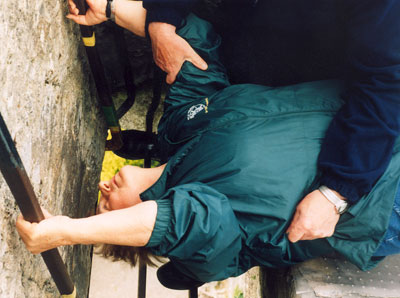The dos and don’ts of planning a successful trip abroad with your grandkids
This article appears on page 50 of the November 2013 issue.
by Chloe Winston; Redding, CA
One of the greatest advantages of being retired, for me, is having the time, energy and financial means to travel with my grandchildren. However, when planning to travel with children, there are some things to consider before flying off to discover other cultures and explore wonderful places.
The right decision?
Begin by considering the following questions.
How old are the children? Where are you planning to go? Do the parents agree with the travel plans? Are the children really interested in going on this adventure with you? Do you get along well with them?
I’ve discovered that taking two kids at a time is ideal, but three are too many to handle. The kids should get along fairly well. You must be willing to expect to and be able to deal with the inevitable frustrations of travel, so it is best if you have some experience with foreign travel. And if planning to go to a country where a language other than English is spoken, it is preferable, though not required, that you have a smattering of knowledge in that language or are willing to find an “easy learning” language book to carry with you.
It is helpful if the children are old enough to lug their own suitcases. Laundry facilities are available in most countries, which lightens the load of how much clothing to pack. Passports and medical information should be in order, and the current rules on allowable carry-on items should be understood.
You’ll also need to be sure that you have written permission from the parents to take the child/children to a foreign country. Be sure to note your travel dates and the countries to be visited. This is crucial!
Group or on your own?
By now, you might have decided to go with a travel company that caters to loving grandparents who are a bit unsure of taking this sort of trip on their own. However, you must consider the, typically, high cost of such travel. It is an option, though.
I’m a bit more comfortable traveling without the aid of a tour company. On my first trip with grandchildren, I took my two oldest grandsons to England, Ireland and Scotland, where there was no major language barrier, although some amusing moments did arise. I planned one week in England, one in Scotland and one in Ireland.
At the time, I was worried that my knees were sending “ready to give out” warnings, so I wanted to make the trip sooner than later. Because both boys were intelligent and personable, I didn’t process the fact that they were only 10, not the 14 they seemed to me. I think traveling with children between the ages of 14 and 16 is probably ideal.
Here are a few more suggestions.
Ask parents to refrain from worrying about infrequent phone calls from their children during the trip. (This proved to be a problem on my trip.) Frequent texting and calls can interfere dramatically with the travel experience.
Children should take an inexpensive camera but leave other electronic “toys” at home. There’s a good chance they’ll get lost.
Clothes should be easy and cheap to replace or launder if there’s a need.
Children should take a couple of pencils (pens leak!) and a light notepad. Each evening, have your grandchildren write where they were, what they saw, what was funny, what was terrible and any other brief comments on the day. But don’t make this feel like homework; this is fun, remember?
Depending on the age of the grandchild, you might want to take charge of medicines and backup prescriptions.
Discuss (calmly, briefly) concerns about safety while traveling. During our trip to England, we came back to Euston Station after a day trip to Bath via train, using our BritRail passes, and I noticed the station was jammed with loud, red-faced Brits celebrating some sport victory. I said, “We’re going to leave here right now!”
My grandsons didn’t agree until we were a half block away and they heard the “waa waa waa” of London police cars coming to break up what I guessed were fights. Not a great place for 10-year-old boys to be!
During our week in Ireland, our activities included kissing the Blarney Stone. My companions were reluctant, but I persisted, since I knew that if they missed this one thing that most people knew about Ireland, they’d be at a conversational disadvantage. We went up the damp steps, the two boys protesting all the way, but when it was over and we were back on green grass, they wanted to go back and do it again!
Before leaving home, encourage children to look up the countries they will visit and ask them to pick some stops that sound interesting to them.
In Scotland, we went out on Loch Ness to look for Nessie. We also went to several famous battlefield sites, strolled along Princes Street in Edinburgh and walked up to the castle and also discovered a wonderful bakery. The boys climbed the stairs of the Scott Monument while I waited for them on a bench down below.
We did a great deal of walking in all three countries. We saw plays, visited historic sites and rode local buses.
In the major cities, we took open-top bus tours, which is a good way to see the major attractions in relative comfort. A guide told stories of the places we passed. (Of course, they were most impressed with the story of Molly Malone in Dublin because the guide described Molly as the “tart with the cart.”)
I highly recommend this mode of travel for getting an overview of your destination. It allows someone besides a grandparent to give information about places and people, which, for the grandchildren, is a nice break.
One of the big reasons to travel with your grandchildren is to offer them a different adventure than staying home and watching TV. With humor, patience and a little pre-trip planning, it is more than doable. It’s wonderful! Bon voyage!


